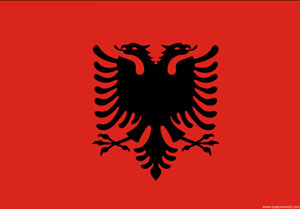
Capital: Tirana
Albania, a small country located in south eastern Europe, is the heart of the Mediterranean. The birth land of Mother Teresa, it is still relatively ensconced from touristic expeditions and offers an elated stint to sightseers all over the world. The Republic of Albania, as it is officially known, is neighbored by Montenegro (former Yugoslavia) on the northwest, Kosovo on the northeast, the Republic of Macedonia on the east and Greece on the south and southeast frontier. Tirana, the capital city of Albania, is home to almost one sixth of the country's population of approximately 3.6 million, and is also the financial capital of the country. Albania has a mountainous terrain. About seventy five percent of its land consists of mountains and hills with elevations approaching 8,900 feet above sea level; the remainder consists of coastal and alluvial lowlands. The Shkumbin river flows in central Albania, meeting the Adriatic Sea northwest of Divjakë. It divides the country into two parts The North and the South. In the North, Albanian Alps, an extension of the Dinaric mountain system, cover the northern part of the country. It is heavily forested and sparsely populated.
The Albanian language (called Shqip by Albanians) is of interest to linguists because, as a descendant of the extinct Illyrian tongue, it is the only surviving member of its branch of the Indo-European language family. There are two principal dialects: Geg, spoken north of the Shkumbin River, and Tosk, spoken in the south. Albania is Europe's only predominantly Muslim country—a legacy of nearly five centuries of Ottoman rule.
The Albanian Culture:
The Albanian culture is marked by its different forms of arts like music, dance and literature. The Albanian folklore, a redolent of Albanian cultural evolution, has many characters of the Albanian mythology included in the Albanian Songs of the Frontier Warriors, the traditional cycle of Albanian epic songs.
Places of Touristic Interests:
Albania has a rich historical heritage. The prime attractions of the this picturesque country are cities full of archeological parks & sites, monuments and museums.
The National Historic Museum in Tirana is worth giving a visit for its privileged antiquity, and is the largest of all in the country.
The main cities for exploring the historical patrimony are Tirana, Durres, Finiq (Phoinike), Vlora, Byllis, Shkodra, Elbasani, KorcaSaranda, and Gjirokastra.
Food:
The cuisine of Albania has a strong influence of its history and culture. By including the herbs and spices which are the natural produce of the local country side, the cuisine connects instantaneously with the Mediterranean climate. The mild climate is also favorable for growing a wide variety of vegetables and fruits which, when combined with meat, contribute to a plethora of delectable Albanian dishes. Albania is popular for its Olives.
A typical Albanian meal ends with a dessert, bringing to the whole experience a sense of completeness.
Milk and milk products such as cheese and buttermilk are also important component of Albanian food.
Climate:
Albania has warm, dry summers and mild, wet winters, a characteristic of a Mediterranean country. However, local climate varies considerably, from one region to another. The western part, which is under the influence of warm maritime air from the Adriatic and Ionian seas, has more moderate temperatures than the rest of the country.
Government:
Albania is a parliamentary democracy. The President is the head of state. The Prime Minister is appointed by the President and approved by a simple majority of all members of the Assembly. The President is also the commander in chief of the armed forces, and chairs the National Security Commission.
The currency of Albania is called Lek (plural leke). It is subdivided into 100 qindarka (singular qindarkë), although qindarka are no longer issued. One USD is approximately 90 lek.
![]()
Mapsnworld.com
©All Rights Reserved "Maps N World"
Sitemap